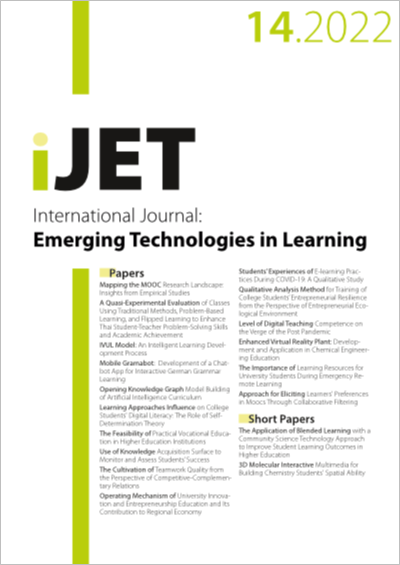Learning Approaches Influence on College Students' Digital Literacy: The Role of Self-Determination Theory
DOI:
https://doi.org/10.3991/ijet.v17i14.31413Keywords:
Digital literacy,, Learning approaches,, Self-determination theory,, College studentsAbstract
The development of digital literacy is believed to be achieved through individual learning and improvements. This study explored the mutual relations between college students' learning approaches and digital literacy by using Self-determination theory (SDT) from a psychological perspective. Structural equation modeling (SEM), part of a quantitative methodology, was designed with data collected through 639 students from three types of universities. SEM was used to verify the crucial indirect influence of SDT by comparing various effects of learning approaches. The results indicated that personal character, deep learning approach, autonomous and relational motivation significantly affect digital literacy. Firstly, age was an influential factor that surpassed various characteristics compared to gender and university type. Secondly, the more students were involved in the deep learning approach, the higher their digital literacy level, and deep learning has proven to significantly enhance their motivation such as autonomy, competence, and relatedness. Furthermore, among SDT, autonomy and relatedness were crucial factors in improving digital literacy, while competence's influence was relatively insignificant. Such results provide valuable insights into the motivational process of improving college students' digital literacy. We demonstrated that any university or society cannot develop their digital literacy in a conventional way.
Downloads
Published
How to Cite
Issue
Section
License
Copyright (c) 2022 Xiaoxia Tian, Kyung Hee Park

This work is licensed under a Creative Commons Attribution 4.0 International License.


